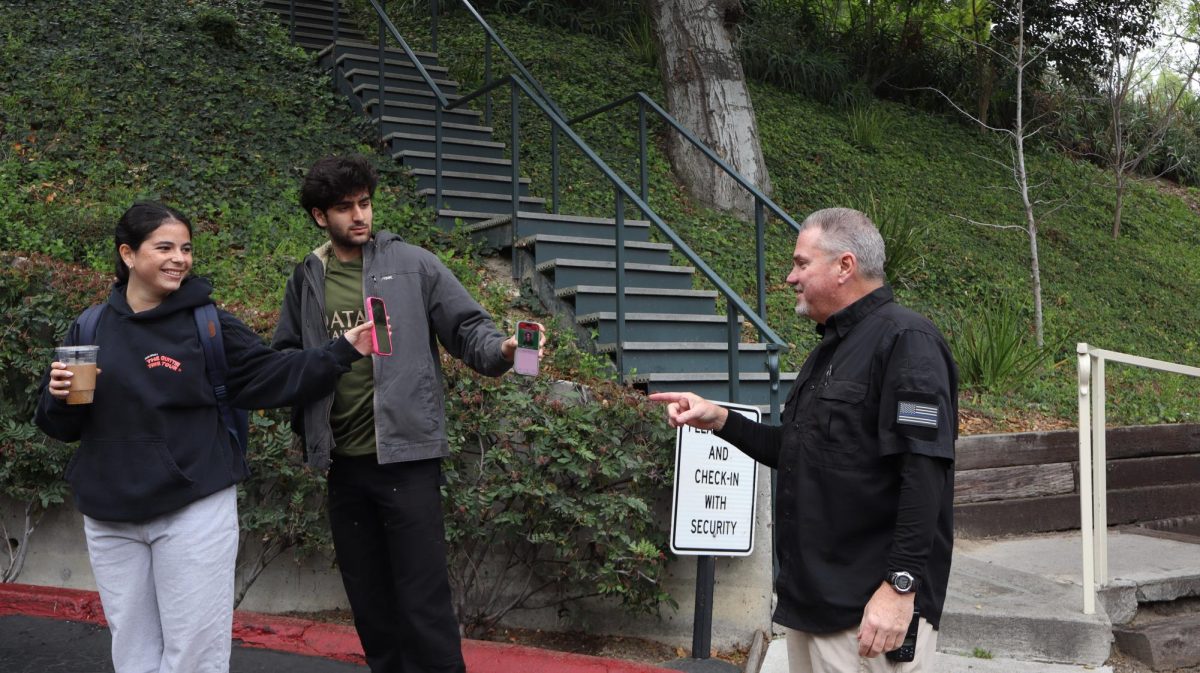Due to complaints of bullying, the administration blocked the location-based, anonymous polling app What’s Goodly from the school Wi-Fi network April 16. Students have still been able to access the app by disconnecting their devices from the Wi-Fi and using cellular data instead.
Assistant to the Head of the Upper School Michelle Bracken said she had asked Computer Services to contact the app’s creators, one of whom is a Harvard-Westlake alumnus, to request a block on the campus’ location so students would not be able to access the app in any way at school. Head of Computer Services Dave Ruben confirmed April 27 he had done so. The block would be similar to Yik Yak’s “GeoFence” that was placed on campus after complaints of bullying on the app were made last May.
“Yik Yak was a learning curve for us,” Bracken said. “When What’s Goodly came up, we were able to go to that knowledge that we learned from Yik Yak and say, ‘We can just shut it down now [on the Wi-Fi] and do more research later.’”
Users of What’s Goodly select their gender and create an anonymous user name and after downloading the app, and can then view, create, like, vote or comment on polls others in the immediate area have made. A poll consists of a question with up to four answer choices for which nearby users can vote. Some polls are only for girls or boys to answer. Users must vote for a poll in order to see its results.
“What’s Goodly is anonymous, and that anonymity makes you feel like you can say whatever you want,” Bracken said. “With Facebook, people usually know who you are, and there’s this kind of self-monitoring that I see happen. With What’s Goodly, there is no way to get to the source, and the people making these mean comments don’t have to take any responsibility for it.”
The app is intended for the use of adults only and, according to its terms and conditions, users under the age of 18 must have their parent or guardian’s consent to use it. However, students under 18 are using What’s Goodly, students said.
What’s Goodly cofounder Chris Sebastian ’13 said that the app was originally created to promote open dialogue and discussions on university campuses. Still, the app’s team has noticed some misuse of the app and are working to limit that.
“Cyberbullying and inappropriate content has no place on What’s Goodly,” he said. “We are currently working on a variety of product features that make it difficult for this type of content to proliferate and are eager to work with users, schools and other parties to make sure the app experience is as enjoyable and stress-free as possible.”
Many of the polls posted have included students’ and faculty members’ names, despite What’s Goodly’s ban on posting names. The app’s moderators delete any question containing a name and suspend the poll’s creator from the app, though they don’t catch every infraction. In response, students have been using code names and initials to identify others.
“The no-name ban isn’t really working because people are using these nicknames, and everybody knows what they stand for,” Naomi Barlava ’17, who has the app, said. “I think what’s being posted on the app is disgusting, offensive and so hurtful to so many people. People are just using it to laugh at the expense of other people, and it’s not okay.”
A large number of the posts contain profanity, racial stereotypes and references to drugs or alcohol. Using “racially or ethnically offensive language” and discussing illegal activity are unauthorized, according to What’s Goodly’s terms and conditions. Users are responsible for the legality of their posts.
“There’s a kind of line you draw where you say ‘kids are kids,’ and the comments on What’s Goodly went way over the line,” Bracken said. “You should be able to come to school and not worry about how someone’s going to rate how your butt looks in a pair of shorts. There were kids who were so upset they didn’t want to leave the bathroom.”
Students mentioned on the app said they want the school to discourage its use.
“It’s frustrating having your life be voted on,” said Marina Weidmann ’17, who saw several polls about her personal life on What’s Goodly. “When you’re talked about publicly like that, you don’t want to read anything more on it. I think the school needs to put this down and maybe just talk to everybody about how it’s not okay to publicly comment and vote on other people’s lives like that.”






























